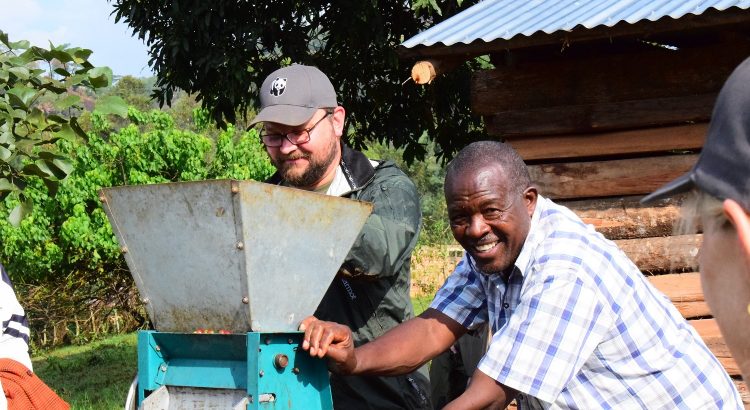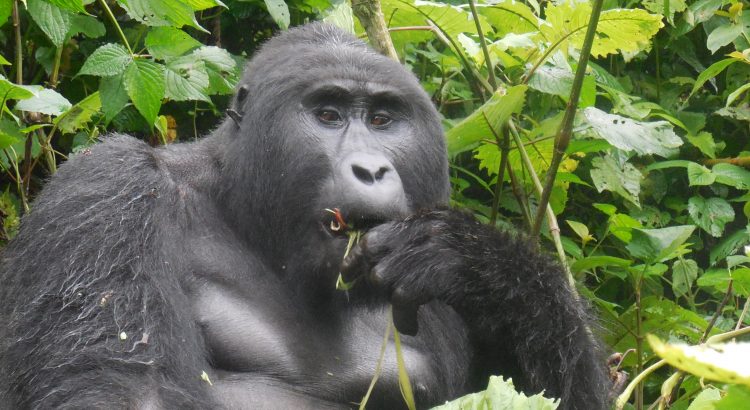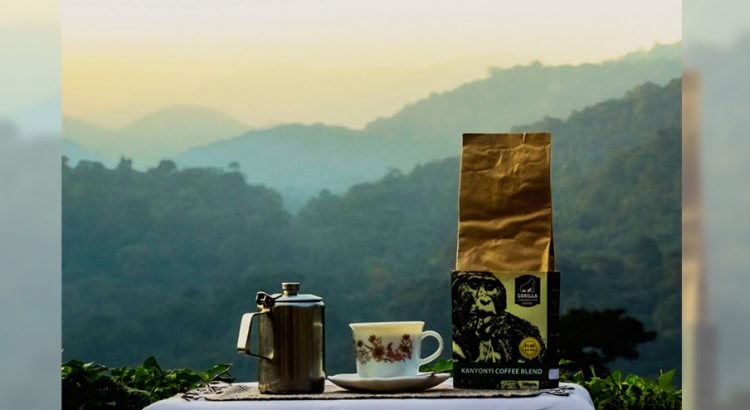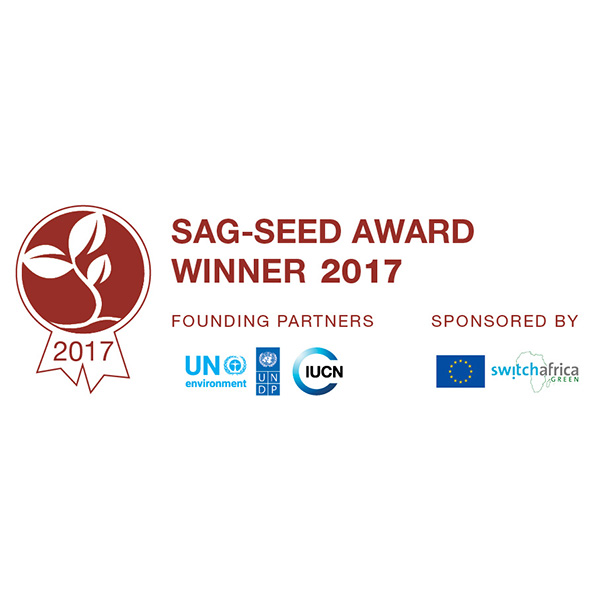
Gorilla Conservation Coffee Safari
By Mark Jordahl, Posted on October 2, 2017 0
Mountain gorillas are some of our closest relatives, sharing as much as 98 percent of our human genes. This remarkable similarity is part of what makes it so profound to spend an hour with these gentle giants on one of our gorilla safaris. Unfortunately, this similarity also means that we can share diseases, and disease transmission from humans to the gorillas poses one of the greatest threats to their survival.
The realization that you can’t address the health of mountain gorillas without also addressing the health of the human communities nearby led Gladys Kalema, the first female veterinarian with the Uganda Wildlife Authority, to create a project called Conservation Through Public Health (CTPH). The team members from CTPH do direct monitoring of gorilla health, and also educate the locals on family planning, personal hygiene, reducing reliance on forest products like firewood, sustainable agricultural techniques, and ways to reduce conflict with the wild gorillas who often enter their farms looking for an easy meal.

Wildlife conservation is not a one-solution issue, and perhaps one of the most important aspects of any conservation program in Africa is helping local people find economic alternatives to extracting resources from natural areas. Any time people enter the protected areas that harbor the mountain gorillas to collect firewood, cut bamboo, or hunt for bush meat, the chance of disease transmission increases. But if those community members have no other source of income, they will do what it takes to feed their families.
CTPH recently received funding from WWF-Switzerland to launch a coffee enterprise to benefit the Buhoma community adjacent to Bwindi Impenetrable National Park, home to nearly half of the world’s remaining mountain gorillas. In July 2017, a small group of Natural Habitat Adventures travelers were the first to have the opportunity to visit the Gorilla Conservation Coffee project on a “coffee safari.”

Coffee is a great crop to grow on the border of gorilla habitat because, so far, mountain gorillas have not caught on to the wonders of drinking coffee. Coffee and tea plantations can create a buffer between the forest and food crops, because the gorillas entering the plantations will turn back, thinking that there is nothing for them to feed on in the area.
The coffee farmers in Buhoma have formed a cooperative to sell fresh coffee beans at a premium to Gorilla Conservation Coffee. The project has invested in processing equipment that gets the beans to the point of being ready to roast. The beans are then sent to Kampala, the capital city of Uganda, where they are roasted and packaged for sale. The income from the coffee supports local farmers and CTPH’s work protecting critically endangered mountain gorillas.

At Natural Habitat Adventures, we are proud to partner with an organization like WWF that looks for opportunities across the globe to provide seed funding that results in long-term, sustainable solutions like this that benefit both people and wildlife. Gorilla trekking in Uganda is one of the many ways that you can support innovative conservation projects like these.
And hey—the world can always use more delicious coffee, right?

© Gorilla Conservation Coffee
SAG-SEED AWARD WINNER 2017
GCCoffee is a for-profit social enterprise aiming to improve livelihoods of coffee farmers and protect mountain gorillas in the area. GCCoffee buys coffee at a premium, processes and sells it as a branded roasted coffee, whose purchase includes a donation to Conservation Through Public Health (CTPH).
GCCoffee pays a premium price to enable marginalised small-holder coffee farmers living in remote sub-counties bordering Bwindi Impenetrable National Park to improve their lives, which keeps them from resorting to damaging the forest through activities like poaching and removing resources like wood. This in turn helps protect the gorillas and their habitat.
GCCoffee also provides training and capacity building to farmers to improve sustainable agriculture practices. GCCoffee targets coffee drinkers and tourists via shops, tourist lodges, airports and international distributors to market and sell coffee.
See details here https://www.seed.uno/awards/all/2017/gorilla-conservation-coffee.html
Great Tasting Coffee with a Purpose
In September 2017, I had the privilege of visiting the Bwindi Impenetrable Park in Western Uganda. Seeing the mountain gorillas has been a long and closely held dream and I was thrilled to realise it in this very special place. As a first-time visitor to Uganda, I came with a suitcase full of imagination fuelled by all the things I had read about East Africa and the gorillas. And I can safely say I took back more than I brought. Not counting the beautiful memories of forest and the people, my most priced take-away from Bwindi was the Ugandan coffee I bought from Gorilla Conservation Coffee (GCCoffee).
As I sip on a cup of this medium roast blend on a nippy December evening in Mumbai, where I live, its aroma infuses in me a warm feeling. This unique marriage of aroma and taste has also become a favourite of my friends, some of whom are budding coffee connoisseurs, having had coffee from several parts of the world.
For me however, what’s most special about this coffee is what it symbolises. GCCoffee is a social enterprise that is committed to providing sustainable livelihoods to Ugandans living around the Bwindi Impenetrable Park: a UNESCO world heritage site and home to nearly half of the world’s 880 surviving mountain gorillas. Created through a partnership between Conservation Through Public Health (CTPH) and WWF Switzerland, GCCoffee is available across Uganda and can also be ordered online here.
CTPH is an NGO with a mission to improve the health of both the mountain gorillas and the people living close to them. Its founder Dr Gladys Kalema-Zikusoka, who I had the fantastic opportunity of meeting, told me how she had the idea of starting GCCoffee when she met the farmers living in and around Bwindi. Since its inception in 2015, it has brought prosperity to coffee farmers in the region. Dr. Zikusoka is an Ashoka Fellow and a well-known champion of gorilla conservation. She says providing livelihood opportunities to farmers is key to meeting conservation goals as it reduces people’s dependency on the forest. This has led to healthier people, gorillas and forests in Bwindi, making it a unique example of humans and protected forests co-existing peacefully.
Coming back to my cup, it is sometimes difficult to fathom if and how our product choices can lead to improved lives and a healthier planet. But the coffee from GCCoffee does just that. With every bag of coffee, you can not only help conserve a forest unmatched in its biodiversity, but also support a community that’s bearing the collective cost of protecting this forest for all of humanity.
And well, if that isn’t alluring enough, the coffee is possibly the best you will ever have, so I highly recommend you try it.
Written by Annie James

Dr Gladys’ tribute to Kanyonyi
It is with great sadness to inform you about the loss of one of my favorite gorillas in Bwindi ImpenetrableNational Park, Kanyonyi, the lead silverback of Mubare group who died on Friday night.
Kanyonyi first fell off a tree, but while he was recovering after treatment, a lone silverback fought with him because he wanted to take over his group. Kanyonyi in his weakened state was not able to put up a good fight, and sustained many injuries, which though they were healing, left him weaker than usual. When I last visited Kanyonyi he was eating quite well, but still limping and walking slowly, with one adult female gorilla, Karungyi and her baby keeping close by his side. He made a nest in front of us to take a comfortable morning nap, and we were able to record a brief video. I would like to thank the Uganda Wildlife Authority park staff and Conservation Through Public Health (CTPH) team who have kept a close watch over Kanyonyi to prevent him from having more interactions with the lone silverback until he was strong enough. Fighting amongst free ranging gorillas is considered to be part of their normal behavior patterns and enables natural group succession.Conservation Through Public Health participated in the post mortem yesterday, which confirmed the major cause of his death to be an infection in the hip joint after the fall.

I have known Kanyonyi since he was a baby, when he was born 20 years ago. In 1998, I successfully operated on his older sister, then a juvenile gorilla called Kahara when she had a rectal prolapse. She was named Kahara because she liked to babysit him. Kanyonyi became the lead silverback of Mubare gorilla group in 2012, after his father, Ruhondeza died. Ruhondeza was the lead silverback of the first gorilla group to be habituated for tourism in Bwindi Impenetrable National Park. Kanyonyi was a playful young silverback who liked interacting with human visitors. Over the past five years, Kanyonyi has kept the Mubare gorilla group together and enabled it to grow through attracting many females.
When we started the Gorilla Conservation Coffee social enterprise in 2015 to support farmers living around Bwindi, we decided to name our first coffee blend after Kanyonyi who symbolizes the gorilla conservation efforts at Bwindi Impenetrable National Park since tourism began in 1993.

May his legacy continue through stories, memories and the Kanyonyi coffee blend.

